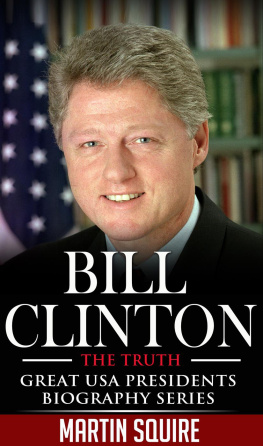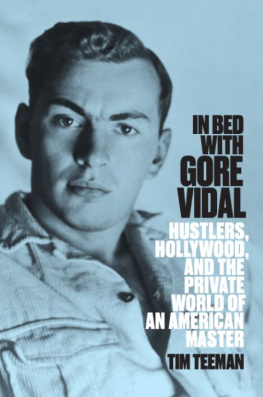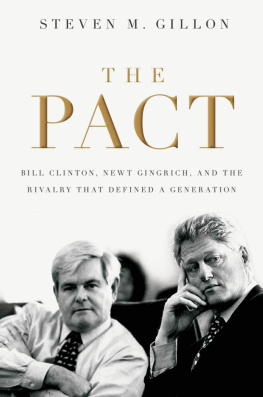Copyright 2000 by Bill Turque
All rights reserved
For information about permission to reproduce selections from this book, write to Permissions, Houghton Mifflin Harcourt Publishing Company, 215 Park Avenue South, New York, New York 10003.
www.hmhco.com
The Library of Congress has cataloged the print edition as follows:
Turque, Bill.
Inventing Al Gore : a biography / Bill Turque.
p. cm.
Includes bibliographical references (p. ) and index.
ISBN 0-395-88323-7
1. Gore, Albert, 1948 2. Vice-PresidentsUnited StatesBiography. 3. Presidential candidatesUnited StatesBiography. I. Title.
E 840.8. G 65 T 87 2000
973-929092dc21 99-058523
eISBN 978-0-544-36426-4
v1.0114
To Melinda,
who showed me the way
Introduction
I TS A NEW DAY , declared Al Gore. He looked like a man who needed one as he stood in the parking lot of his transplanted campaign headquarters near downtown Nashville on the morning of October 6, 1999. Less than four months before the first primary ballots would be cast, the presidential candidacy he had planned for nearly a decade was close to a shambles. This had been Gores race to lose, and he was proving every bit up to the task. Seldom, if ever, had a front-runner for his partys nomination squandered his advantages with such breathtaking speed. The early months of the Gore 2000 campaign had been a blooper reel of muddled messages, botched events, backstage intrigue, profligate spending, and plain bad luck. His missteps, and the unexpectedly broad appeal of his sole opponent, former basketball star and New Jersey senator Bill Bradley, had transformed virtually assured victory into a bona fide race.
Looking for ways to deflect attention from the eroding poll numbers and months of bad press, he challenged Bradley, whom he had foolishly ignored, to a series of debates, and he promoted an African American woman, his political director Donna Brazile, to campaign manager. But his most dramatic decision was to pull the entire Gore 2000 operation out of Washington and move it to the state he had represented in the House and Senate for sixteen years, setting up shop hard by the railroad tracks a couple of miles from downtown, in a drab, one-story building that once housed a physical rehabilitation center. The resettlement was expected to winnow the organizations top-heavy payroll of those not interested in packing up their lives and making the 560-mile trek. But it was symbolism, not cost-efficiency, that propelled the change of address.
It was Gores way of saying that he was free: from the ways of Washington and, most importantly, from the shadow of the president whose scandal-pocked image was undermining his candidacy. A new look on the road reinforced the message of metamorphosis. He shed his dark blue business suits for earth tones, khaki, and cowboy boots and traded in his lectern with the vice presidential seal for stools and wireless microphones. Autobiography replaced worthy ten-point policy proposals in a retooled stump speech as he spoke in more detail than ever before about the legacy of his politician-parents and his own winding path to public service. Finally, his advisers proclaimed, the real Al Gore had come to the party. Prometheus unbound! exulted one young aide. In recent days Gore had even taken to quoting from the old Janis Joplin tune: Freedoms just another word for nothing left to lose.
But far from a new day, the retreat to Nashville was part of an old story for Al Gore. Once more he was trying to convince the world, and perhaps himself, that he was his own mannot a senators son packing off to the army or a vice president dutifully defending his disgraced benefactor. Gore is an unusually thoughtful politician who has been an important, even prophetic voice on issues like global warming, arms control, and the changes wrought by the Information Age. But his life and career have also been punctuated by separations never quite achieved, and by bold strokes never quite converted into personal or political liberation.
I began work on this book in early 1997 with two questions in mind: Who is Al Gore, and what forces shaped the man who may be the first American president to take office in the twenty-first century? The vice president was an intriguing subject, because so much of his story seemed to be unexplored. After twenty years in public life, he still existed largely in the broad sketch lines of caricature, known mostly for his wooden public style and fervent environmentalism.
No one is a caricature, and the fuller portrait that emerged was complex and conflicted. Al Gore is at home with ideas but deeply wary of people, religious but possessed of an equally abiding faith in the blessings of science and technology, protective of his familys privacy yet willing to exploit personal tragedies for political gain. His carefully tended Dudley Do-Right image obscures a keen, and sometimes ruthlessly competitive nature. As an elected official, his record reflects the impulses of caution and daring that compete withinwith caution usually prevailing. And there is, of course, the disconnect between his so-called stiff public presence and the warmer, more spontaneous personality known to family, friends, and journalists working off the record.
The schism is reala vestige of the old senatorial formality embodied by the father he revered and fearedand to contemporary audiences he can come off as contrived and phony, even when hes not. But the problem has been exaggerated, given a life of its own after years of being picked over by the press, pundits, and even his own handlers. It is also, in the end, a distraction from the real paradox of Al Gore, a man who at critical moments has proclaimed independence and then retreated from it, stood on principle and deferred it to political ambition.
Gore learned early how to make others agendas his own. He is both beneficiary and prisoner of an extraordinary political education, provided by parents who yearned to see their son follow them into public life, and perhaps reach the presidency. The great expectations weighed heavily on the young Gore and turned him into what one friend called the secular equivalent of the preachers son, intent on modeling perfect behavior and avoiding any action that might reflect poorly on his father.
Confronted with his first adult decision of conscience, he made it not as his own man but as a political agent of his father. He hated the Vietnam War as a Harvard undergraduate and scorned the countrys obsessive anticommunism, calling it a national madness in a letter to the senator. As graduation neared in 1969, he found himself torn between misgivings about the draft and concern for his fathers political career, imperiled in 1970 by his own outspoken opposition to the war. Al Gore maintains that his motivation was ethicalto prevent some less-connected boy registered with his Tennessee draft board from having to go in his place. But some of his Harvard friends clearly sensed that Gore was discharging a family duty, protecting not the kid down the road but a political franchise. Had his father been a bank president or insurance executive, he would have contrived to avoid service, as most of his classmates did. Instead, he marched off to a war he believed was wrong.
After the senators bitter 1970 defeat and a short Vietnam tour, Gore returned home to Tennessee with another vow to forge his own path. He announced that he would have nothing to do with politics and instead threw himself into religious studies and a promising newspaper career in Nashville. To the dismay of Albert and mother Pauline, he talked about a life of painting and writing, or perhaps parlaying journalism and law into a career. But it didnt take much to draw him back into his parents design for his life. His father sold him a farm just across the Caney Fork River from the family home, one that also happened to be in the congressional district that Albert Gore had represented. When the seat opened up in 1976, the younger Gore immediately jumped into the race. He delighted the old senator by running but crushed him by asking that he not play any public role in the campaign. It had been only six years since Tennesseans turned Albert Gore out of office, and he remained a divisive figure in some parts of the state, including his old home district. Gore didnt want the political baggage, but more important, he wanted to be seen as standing on his own. His father complied, although he and Pauline played a critical behind-the-scenes role, marshaling old friends and supportersincluding businessman Armand Hammerto underwrite their boys first victory. At twenty-eight, Gore was on his way to Washington.
Next page





